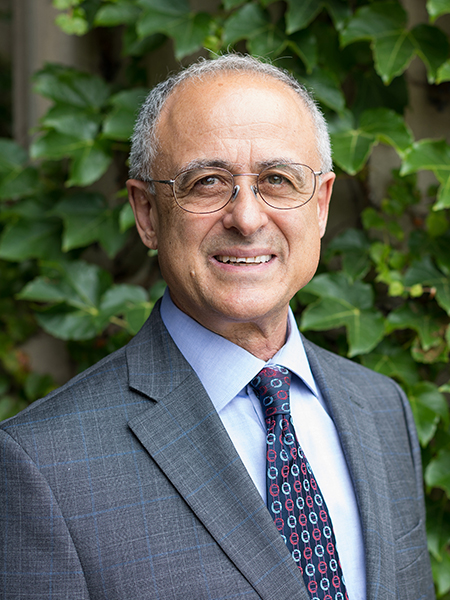Mostafa Kaveh
Dean, College of Science and Engineering, University of Minnesota
BSEE 1969, PhD EE 1974
"What wisdom can you find that is greater than kindness?"Jean-Jacques Rousseau
For his championing of key technical contributions in signal and image processing, including the applications of biomedical processing, differential tomography and wireless communications, leading to international acclaim as both a scholar and distinguished academic leader.
The consummate researcher, educator and administrator, Mostafa (Mos) Kaveh has dedicated 50 years to advancing knowledge in his field and fostering future scholars.
Kaveh's internationally recognized research has focused primarily on statistical signal processing, communications, and image processing. It has addressed problems inherent in wireless communications using multiple antennas, sensor array signal processing, image enhancement and restoration.
In signal processing, he has pioneered algorithms for antenna arrays for communication and accurate source localization. He also has developed models and reconstruction algorithms for ultrasonic tomography, and for the restoration of degraded images. He has worked on cooperative and collaborative transmission systems for wireless communications and developed parametric statistical models for fading wireless channels, and space-time interference-canceling receivers for Code Division Multiple Access systems.
Kaveh says his time at Purdue, both as an undergraduate and as a PhD student, defined his academic career.
"I had the good fortune to be invited to join the R&D Option — much like an honors track," he says. "The curriculum provided a solid background, supplemented by undergraduate research for graduate school or work in industrial R&D.
"During my PhD studies, I had opportunities for interdisciplinary work that included experiences in designing and building systems such as medical ultrasound and a radar system, and doing associated theoretical and algorithmic work."
Kaveh was named a fellow of IEEE in 1988 for his contributions to Diffraction Tomography — a technique he co-developed for ultrasonic imaging of soft tissue, and became an AAAS fellow in 2010. He received the IEEE Signal Processing Society Norbert Wiener Society Award in 2000 for his contributions in array signal processing, which is critical for today's wireless communication networks. For his part in defining the field of signal processing, Purdue University awarded Kaveh the Outstanding Electrical and Computer Engineer Award in 2002.
His contributions have been so extensive that in 2017, the University of Minnesota held the "Workshop to Honor Mos Kaveh: From UMN to SPS, IEEE, and Beyond."" The speakers were a who's-who of top signal processing researchers, and one talk was titled, "Mos Kaveh: Five decades of global impact."
As the former dean of the College of Science and Engineering at the University of Minnesota, his advice for engineering undergraduates is to take full advantages of the many rich opportunities to learn in and out of the classroom: "Societal challenges are multifaceted, with science and engineering are often important, but not exclusive components in the solutions. Take advantage of the incredible opportunities on campus for a well-rounded education and the basis for continuing as a lifelong learner after graduation."
Career Highlights
| 2018-2022 | Dean, College of Science and Engineering (CSE), University of Minnesota |
|---|---|
| 2005-2018 | Associate Dean, Research and Planning, CSE, University of Minnesota |
| 1990-2005 | Head, Electrical and Computer Engineering Department (ECE), University of Minnesota |
| 1985-present | Professor, ECE, University of Minnesota |
| 1980-1985 | Associate Professor, Electrical Engineering (EE), University of Minnesota |
| 1975-1980 | Assistant Professor, EE, University of Minnesota |
| 1975 | Post-doc and teaching, EE, Purdue University |
Education
| 1969 | BS Electrical Engineering, Purdue University |
|---|---|
| 1970 | MS Electrical Engineering, University of California, Berkeley |
| 1974 | PhD Electrical Engineering, Purdue University |

